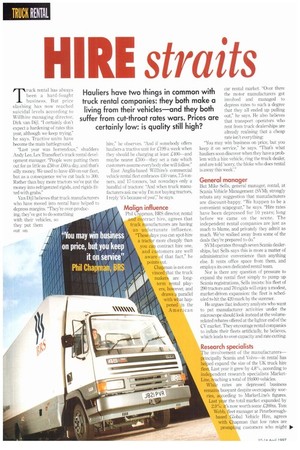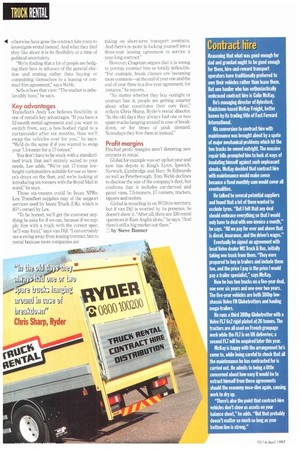Hilt
Page 44

Page 46

If you've noticed an error in this article please click here to report it so we can fix it.
straits
Truck rental has always been a hard-fought business. But price slashing has now reached suicidal levels according to Willhire managing director, Dirk van Dijl. "I certainly don't expect a hardening of rates this year, although we keep trying," he says. Tractive units have become the main battleground.
"Last year was horrendous," shudders Andy Lee, I.ex Transfleet's truck rental devel. opment manager. "People were putting them out for as little as ,C50 or £60 a day, and that's silly money. We used to have 450 on our fleet, but as a consequence we've cut back to 300. Rather than buy more tractors we've put the money into refrigerated rigids, and rigids fitted with grabs."
Van Dij1 believes that truck manufacturers who have moved into rental have helped to depress margins. "They're over-produc hire," he observes. "And if somebody offers hauliers a tractive unit for J:199 a week when they should be charging at least £400—and maybe nearer £500—they set a rate which customers assume everybody else will follow" East Anglia-based Willhire's commercial vehicle rental fleet embraces 450 vans, 7.5-tonnets, and 17-tonners, but nowadays only a handful of tractors: "And when truck manufacturers ask me why I'm not buying tractors, I reply 'it's because of you'," he says.
Malign influence
Phil Chiipman, BRS director, rental
an n tract hire, agrees that truck manufacturers are having an unfortunate influence. "These clays you can spot-hire a tractor more cheaply than you can contract hire one, and customers are well aware Hf that fact," he points out.
Chapman is not convinced that the truck makers are longterm rental players, however, and draws a parallel with what happened in the
car rental market. "Over there the motor manufacturers got involved and managed to depress rates to such a degree that they all ended up pulling out," he says. He also believes that transport operators who rent from truck dealerships are already realising that a cheap rate isn't everything: "You may win business on price, but you keep it on service," he says, "That's what hauliers soon discover when they have a problem with a hire vehicle, ring the truck dealer, and are told 'sorry, the bloke who does rental is away this week'."
General manager
But Mike Sells, general manager, rental, at Scania Vehicle Management (SVM), strongly rebuts any suggestion that manufacturers are discount-happy. "We happen to be a convenient scapegoat," he says. "Hire rates have been depressed for 10 years; long before we came on the scene. The independent rental companies are just as much to blame, and privately they admit as much. We've walked away from some of the deals they're prepared to do."
SVM operates through seven Scania dealerships, but Sells says this is more a matter of administrative convenience than anything else. It rents office space from them, and employs its own dedicated rental team.
Nor is there any question of pressure to expand the rental fleet simply to pump up Scania registrations, Sells insists: his fleet of 290 tractors and 70 rigids will enjoy a modest, market-driven expansion: the fleet is scheduled to hit the 420 mark by the summer.
He argues that industry analysts who want to put manufacturer activities under the microscope should look instead at the volumerelated rebates offered at the lighter end of the CV market. They encourage rental companies to inflate their fleets artificially, he believes, which leads to over-capacity and rate cutting.
Research specialists
The involvement of the manufacturers— principally Scania and Volvo—in rental has helped expand the size of the UK truck hire fleet Last year it grew by 4.8%, according to independent research specialists MarketLine. reaching a total of 19,600 vehicles. While rates are depressed business remains buoyant despite overcapacity worries, according to Markettine's figures. Last year the total market expanded by 2.9%: it's now worth some .C260m. Tom Webb, fleet manager at Peterboroughbased Global Vehicle Hire, agrees with Chapman that low rates are prompting customers who might 4111 otherwise have gone the contract-hire route to investigate rental instead. And what they find they like about it is its flexibility at a time of political uncertainty
"We're finding that a lot of people arc hedging their bets in advance of the general election and renting rather than buying or committing themselves to a leasing or contract hire agreement," says Webb.
Sells echoes that view: "The market is unbelievably busy," he says.
Key advantages
Transfleet's Andy lee believes flexibility is one of rental's key advantages. "If you have a 12-month rental agreement and you want to switch from, say, a box-bodied rigid to a curtainsider after six months, then we'll swap the vehicles over for you," he says. "We'd do the same if if you wanted to swap your 7.5-tonner for a 17-tormer."
You don't have to be stuck with a standardised truck that isn't entirely suited to your needs, Lee adds. "We've put 17-tonne lowheight curtainsiders suitable for use as brewer's drays on the fleet, and we're looking at introducing six-tonners with the Royal Mail in mind," he says.
Those six-tonners could be Isuzu NPRs: Lex Transfleet supplies may of the support services used by Isuzu Truck (UK), which is 85% owned by Lex.
"To be honest, we'll get the customer anything he asks for if we can, because if we supply him with a truck with the correct spec, he'll stay loyal," says van Dijl. "I can certainly see a swing away from leasing/contract hire to rental because more companies are taking on short-term transport contracts. And there's no point in locking yourself into a three-year leasing agreement to service a year-long contract."
However, Chapman argues that it is wrong to portray contract hire as totally inflexible. ''For example, break clauses are becoming more common—at the end of year one and the end of year three in a five-year agreement, for instance," he reports.
"No matter whether they buy outright or contract hire it, people are getting smarter about what constitutes their core fleet," reflects Chris Sharp, Ryder's rental director. "In the old days they always had one or two spare trucks hanging around in case of breakdown, or for times of peak demand. Nowadays they hire them in instead."
Profit margins
Pinched profit margins aren't deterring new entrants to rental.
Global for example was set up last year and now has depots in King's Lynn, Ipswich, Norwich, Cambridge and Bury St Edmunds as well as Peterborough. Tom Webb declines to disclose the size of the company's fleet, but confirms that it includes car-derived and panel vans, 7.5-tonners, 17-tonners, tractors, tippers and reefers.
Global is muscling in on Willhire territory, but if van DijI is worried by its presence, he doesn't show it. "After all, there are 330 rental operators in East Anglia alone," he says. "And there's still a big market out there."
-_-_ by Steve Banner












































































































